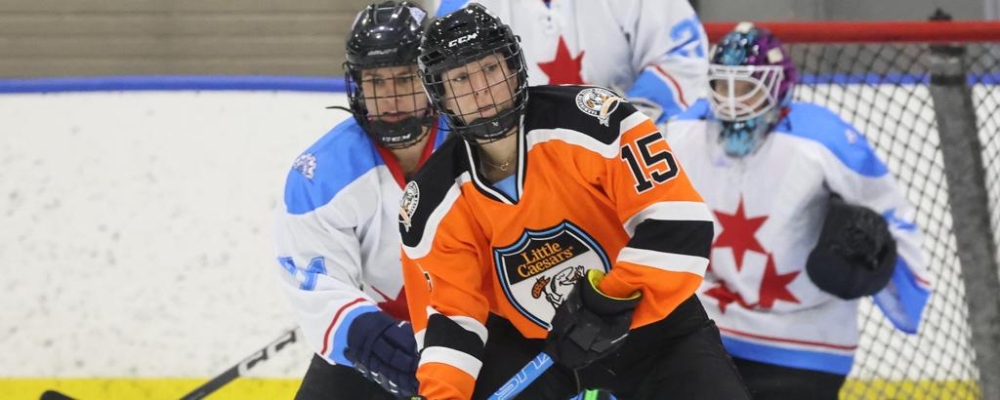Little Caesars Women’s Hockey Program Helping Grow Coaching Ranks While Still Having Fun On The Ice

WESLEY CHAPEL, Fla. – Brad Johnson may be the head coach of the Little Caesars Women’s Hockey teams at the 2025 USA Hockey-Long Drink Adult Women’s National Championships, but he could easily turn the reigns over to more than half of his roster.
Eighteen of the 32 players for Little Caesars two teams that are competing inside AdventHealth Ice Center are also USA Hockey certified coaches. The group of women work with various youth and girls hockey teams, including at the Tier I and II levels, as well as Learn To Skate programs, throughout Michigan when they are not potting goals and having fun on the ice themselves as players.
Johnson explained Saturday morning that this is all by design prior to the Foundry 13 Little Caesars Women’s Hockey team defeating the Carolina Lady Hurricanes A team, 6-4, in 21+ Tier I competition and punch their ticket to Championship Sunday.
“A lot of these players coming into our program still want to play competitive hockey and they're obviously still passionate about the sport, so the next step for some could be coaching,” Johnson explained. “Our goal when we started this program over 10 years ago was to provide more opportunities for women to play competitive hockey, if that’s what they want, and get them interested in coaching youth hockey.”
Little Caesars has resources set aside to help players receive proper training and certification to become youth and girls hockey coaches if they are interested.
“We have a fund, and a couple of sponsors, where we can pay for their USA Hockey registration, pay for their coaching education fee and pay for their background check,” Johnson said. “Basically, we want to eliminate any financial obstacles that may prevent them from getting into coaching.”
Stacey Hochkins, a co-captain for Little Caesars, is an assistant coach at Lawrence Tech University and said additional female coaches are only going to help elevate the future of girls hockey.
“It’s just so important for the younger players to have role models – female role models,” Hochkins said. “We've been through similar experiences and can share their love for the game and the camaraderie. We just carry a different perspective. All coaches are great, male and female, but we have a little bit of a different perspective. That's really helpful for the girls to have someone like that."
On the ice, Hochkins is also proud of the growth of the Little Caesars Women’s Hockey program.
“It's really cool because we started coming down here (for nationals) in 2021, and we had nine players,” Hochkins said. “Now we have two teams and 30 girls. The environment, the community, and the support both from from a team standpoint
Anna Braschwitz, who played ACHA club hockey at Grand Valley State, joined Little Caesars two years ago and worked with Johnson to get her coaching credentials, and she is now helping with Learn To Skate and Learn To Play programs at USA Hockey Arena.
“At first I didn’t join, but I started to want something fulfilling with the sport and give back,” Braschwitz said. “When you grow up with it like we did, you see where girls hockey is now and where it was. I am so fortunate to have found a team like this to keep playing, and now I want to give back a little bit too.”
Little Caesars’ practices, as well as team dinners and other functions, also serve as a coaching thinktanks at times with everyone sharing tips and advice.
“They have this support of knowing their teammates are coaches, they got somebody right here who they can turn to instead of the old dude who has been doing this for 30 years,” Johnson said. “There is that hockey family of what we have created with support and structure at a financial and peer to peer level.”
Alexis Glenn, a co-captain for Little Caesars, actually began her coaching career 20 years with the Tampa Bay Lightning’s summer hockey programs.
She agreed with Johnson that her teammates have been good resources for each other as they enter into the coaching realm.
“It’s pivotal to make it less intimidating to get involved in coaching,” Glenn said. “This allows for a mentorship program that keeps growing. It is good to make coaching a normal step in the process to keep growing the game, while also being able to still play competitively.”
Johnson knows that as girls and women’s hockey continues to grow, so too will the demand for female coaches as well. He hopes that by tapping into adult players, and especially recent college players, that will lead to more women getting involved in coaching.
“We’ve really gained some momentum here recognizing there are not enough female coaches for the female game,” Johnson concluded. “We want to help fix that. We are getting there. This will be great for our sport.”
Source: usahockey.com
